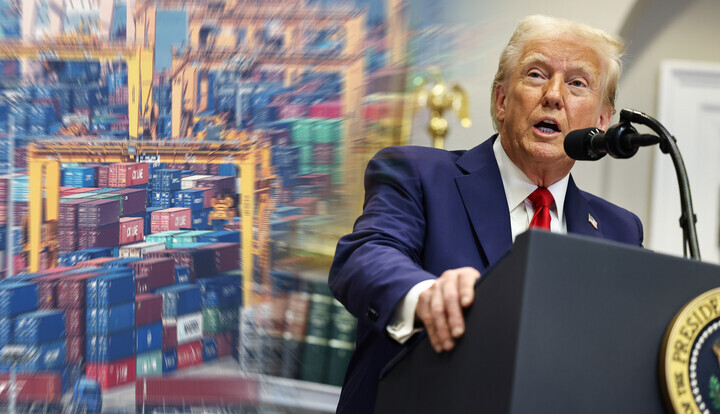
Washington D.C. – The United States economy has delivered a significant shock, reporting a contraction of 0.3% in its Gross Domestic Product (GDP) for the first quarter of the current year compared to the same period in the previous year. This downturn, the first instance of negative growth in three years since the upheaval caused by the COVID-19 pandemic, has ignited concerns about the trajectory of the nation's economic health under the Trump administration. The unexpected slump has been attributed primarily to a surge in imports and a notable decrease in government spending, raising alarms about the potential for stagflation – a debilitating combination of stagnant economic growth and persistent high inflation – if current policy directions are not swiftly recalibrated.
The Bureau of Economic Analysis's (BEA) report, released on April 30th, revealed a stark divergence between exports and imports during the first three months of the year. While U.S. exports saw a modest increase of 1.8%, imports experienced a dramatic surge of 41.3%. This substantial uptick in imports is largely interpreted as a preemptive measure by businesses to stockpile goods ahead of the full implementation of new tariffs in the subsequent month. The trade imbalance was further underscored by a record-breaking goods trade deficit in the preceding month, reaching $162 billion, a 9.6% increase from the prior month.
In response to the grim economic data, President Donald Trump was quick to deflect blame, attributing the first-quarter contraction to the policies of the previous Biden administration. However, this assertion has been met with skepticism and direct contradiction from numerous domestic media outlets and economic analysts. They argue that the negative growth is, in fact, a direct consequence of President Trump's own aggressive tariff policies, which appear to be having an adverse boomerang effect on the American economy.
Further analysis of the BEA data reveals other concerning trends. The growth rate of federal government spending in the first quarter was a tepid 5.1%, indicating a slowdown in public sector contributions to economic activity. More alarmingly, private consumption expenditure, which constitutes over two-thirds of the U.S. economy, registered a growth of only 1.8%. This figure represents a significant deceleration from the 4% growth experienced in the previous quarter and marks the weakest expansion in consumer spending since the first quarter of 2023, when it stood at 1%.
Axios, a prominent online news platform, offered a critical assessment, stating that the contraction signifies a weakening economic momentum even before the imposition of reciprocal tariffs on April 2nd. This observation suggests that the anticipated impact of the fully enacted tariffs in the second quarter could further dampen consumer spending and overall economic activity.
Economists Warn of Stagflation Risk Amidst Tariff Impasse
Leading economists are increasingly vocal in their warnings that the U.S. economy faces a heightened risk of stagflation in the latter half of the year unless there is a fundamental shift in the current tariff policy. Joseph Brusuelas, chief economist at RSM US, cautioned in a statement to Reuters that "unless tariffs are withdrawn quickly, it will be too late to avoid a recession," predicting that discussions about a recession would likely emerge by mid-year.
Echoing these concerns, Mark Zandi, chief economist at Moody's Analytics, highlighted the recent decline in the April consumer sentiment index as a worrying indicator. "It doesn't seem like consumers will hold up going forward," Zandi stated, emphasizing the precariousness of consumer spending in the face of rising costs potentially exacerbated by tariffs. He further warned that the failure to develop a "tariff exit strategy" would likely lead to further negative economic indicators and, ultimately, job losses.
The predicament is compounded by the potential ramifications even if tariffs were to be suspended or rescinded. The inherent unpredictability and volatility of the Trump administration's trade policies have eroded market confidence. James Egelhoff, an economist at BNP Paribas, articulated this concern, stating that a "yo-yo" effect of tariffs – repeated impositions and removals – would paralyze business decision-making and stifle overall economic activity due to the uncertainty it creates.
Trump Intensifies Tariff Defense, Praises Hyundai Investment
Faced with mounting criticism and concerning economic data, President Trump has intensified his efforts to defend his tariff policies. During a recent cabinet meeting at the White House, he actively promoted the benefits of tariffs, specifically citing investments from global corporations such as Hyundai Motor. At the 'SelectUSA Investment Summit,' an event aimed at encouraging foreign direct investment in the United States and attended by approximately 20 international CEOs, President Trump asserted that the assembled companies had collectively announced over $2 trillion in new investments, a figure he hailed as "unprecedented in American history." He explicitly linked these investment commitments to the pressure exerted by his administration's tariffs.
In a notable moment, President Trump singled out Jose Muñoz, the president of Hyundai Motor, for praise. He lauded Hyundai's $2.1 billion investment pledge in the U.S. and the anticipated job creation resulting from the construction of a new steel mill in Louisiana. Addressing Muñoz directly, President Trump repeatedly exclaimed, "Jose, thank you, beautiful," underscoring his administration's narrative that tariffs are a catalyst for increased foreign investment and job growth within the United States.
However, this perspective is heavily contested by economists and trade experts who argue that while some companies may choose to invest in the U.S. to mitigate the impact of tariffs, the overall economic consequences of broad-based tariffs, including increased costs for consumers and businesses, outweigh any potential benefits from targeted investments. The Q1 GDP contraction serves as a stark reminder of the potential negative repercussions of protectionist trade policies on the broader economy. The coming months will be critical in determining whether the Trump administration will heed the warnings of economists and adjust its trade strategy to avert a deeper economic downturn.
[Copyright (c) Global Economic Times. All Rights Reserved.]




























